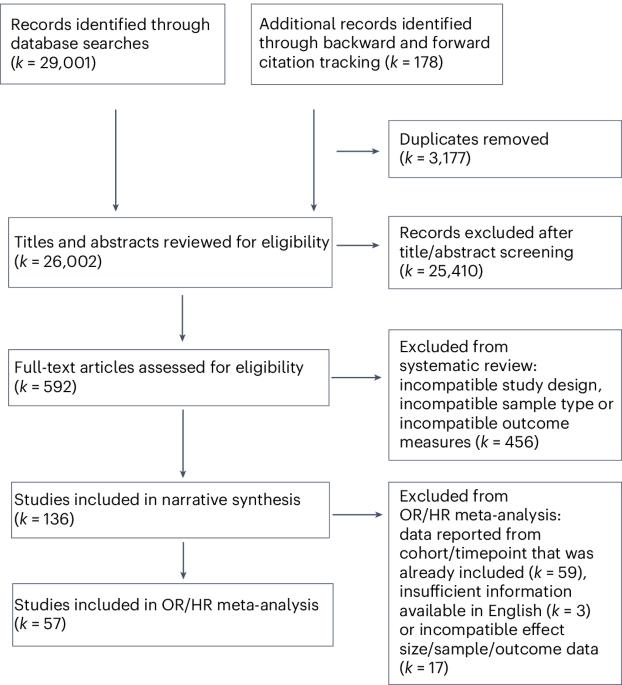A meta-analysis of technology use and cognitive aging
IF 15.9
1区 心理学
Q1 MULTIDISCIPLINARY SCIENCES
引用次数: 0
Abstract
The first generation who engaged with digital technologies has reached the age where risks of dementia emerge. Has technological exposure helped or harmed cognition in digital pioneers? The digital dementia hypothesis predicts that a lifetime of technology exposure worsens cognitive abilities. An alternative hypothesis is that such exposures lead to technological reserve, wherein digital technologies promote behaviours that preserve cognition. We tested these hypotheses in a meta-analysis and systematic review of studies published in Medline, PsycInfo, CINAHL, Science Direct, Scopus, Cochrane Library, ProQuest and Web of Science. Studies were included if they were observational or cohort studies focused on general digital technology use in older adults (over age 50) and included either a cognitive or dementia diagnosis outcome. We identified 136 papers that met inclusion criteria, of which 57 were compatible with odds ratio or hazard ratio meta-analysis. These studies included 411,430 adults (baseline age M = 68.7 years; 53.5% female) from cross-sectional and longitudinal observational studies (range: 1–18 years, M = 6.2 years). Use of digital technologies was associated with reduced risk of cognitive impairment (OR = 0.42, 95% CI 0.35–0.52) and reduced time-dependent rates of cognitive decline (HR = 0.74, 95% CI 0.66–0.84). Effects remained significant when accounting for demographic, socioeconomic, health and cognitive reserve proxies. All studies were evaluated for quality on the basis of a standardized checklist; the primary outcomes replicated when limiting analyses to the highest-quality studies. Additional work is needed to test bidirectional causal interpretations, understand mechanisms that underpin technological reserve, and identify how types and timings of technology exposures influence cognitive health. The first generation who engaged with digital technologies has reached the age where risks of dementia emerge, and the question emerges how digital technologies have affected cognitive capabilities. This meta-analysis synthesized existing evidence of 57 studies, finding that the use of digital technologies was associated with a reduced risk of cognitive impairment.


科技使用与认知老化的元分析
第一代接触数字技术的人已经到了痴呆症风险出现的年龄。技术接触对数字先驱者的认知有帮助还是有害?数字痴呆假说预测,终生接触科技产品会使认知能力恶化。另一种假设是,这种暴露导致了技术储备,其中数字技术促进了保持认知的行为。我们对发表在Medline、PsycInfo、CINAHL、Science Direct、Scopus、Cochrane Library、ProQuest和Web of Science上的研究进行了荟萃分析和系统综述,对这些假设进行了检验。如果研究是观察性或队列研究,重点关注老年人(50岁以上)的一般数字技术使用情况,并包括认知或痴呆诊断结果,则纳入研究。我们确定了136篇符合纳入标准的论文,其中57篇符合优势比或风险比荟萃分析。这些研究纳入了411,430名成年人(基线年龄M = 68.7岁;53.5%女性),来自横断面和纵向观察性研究(范围:1-18岁,M = 6.2岁)。数字技术的使用与认知障碍风险降低(OR = 0.42, 95% CI 0.35-0.52)和认知衰退时间依赖性降低(HR = 0.74, 95% CI 0.66-0.84)相关。当考虑到人口、社会经济、健康和认知储备代理时,效果仍然显著。所有的研究都是在标准化检查表的基础上进行质量评估的;当将分析限制在最高质量的研究中时,主要结果是重复的。需要进一步的工作来测试双向因果解释,理解支撑技术储备的机制,并确定技术暴露的类型和时间如何影响认知健康。
本文章由计算机程序翻译,如有差异,请以英文原文为准。
求助全文
约1分钟内获得全文
求助全文
来源期刊

Nature Human Behaviour
Psychology-Social Psychology
CiteScore
36.80
自引率
1.00%
发文量
227
期刊介绍:
Nature Human Behaviour is a journal that focuses on publishing research of outstanding significance into any aspect of human behavior.The research can cover various areas such as psychological, biological, and social bases of human behavior.It also includes the study of origins, development, and disorders related to human behavior.The primary aim of the journal is to increase the visibility of research in the field and enhance its societal reach and impact.
 求助内容:
求助内容: 应助结果提醒方式:
应助结果提醒方式:


